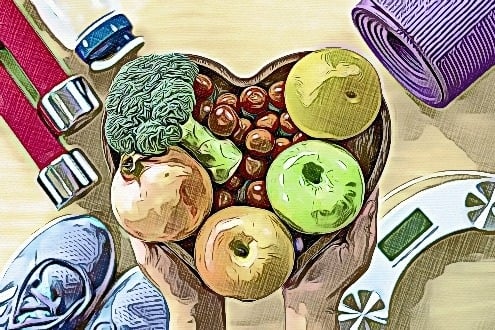12 Data-Driven Approaches to Weight Loss and Healing
"I was overwhelmed by all the weight loss advice out there and didn't know what to trust until I watched this video…"
The issue is that we're not giving the body the chance to activate its natural fat-burning and healing abilities
And this video demonstrated how it's possible to unlock the body’s full potential overnight.

Here's how to unlock your body's true fat-burning and healing potential.


.jpg)

12 Science-Based Weight Loss & Healing Tips
What does it take to heal and lose weight? Many people try various methods to shed pounds, but these approaches often involve significant sacrifices with no guarantee of success. In some cases, these weight loss schemes might even pose potential risks to our health. To save time and effort and to avoid ineffective or harmful methods, here are 12 science-based tips to help you heal and lose weight effectively:
1. The Power of Nutrient-Dense Foods
Eggs and Protein-Rich Foods: Research indicates that starting your day with eggs can lead to reduced calorie intake throughout the day.
Eating protein-rich foods, such as eggs, increases satiety and helps you feel fuller throughout the day.
Spicy Foods*: Incorporating a bit of spice into your diet can help reduce appetite and potentially aid in weight loss.
Chili peppers contain capsaicin, a compound that boosts body heat and accelerates metabolism.
Foods Rich in Fiber: Incorporate apples, sweet potatoes, berries, and chickpeas into your diet. These fiber-rich foods help promote satiety and support overall fitness.
In addition to their nutritional benefits, fiber-rich foods help us feel fuller for longer. Unlike sugar and starch, which are digested quickly, fiber takes more time to break down, helping to control hunger and support weight management.
Consume whole foods - A diet with whole food means munching on foods in their natural form or at least close to their naturals.
- **Consume Whole Foods**: Opt for a diet that includes foods in their natural or minimally processed form. Whole foods retain their nutrients and provide better health benefits compared to processed alternatives. These unprocessed food forms retain more nutrients than their processed counterparts.
2. The Worst Foods for Your Diet:
Refined Grains and Sugar: These are less nutritious compared to their natural forms and can contribute to weight gain and health issue
Studies show that refined carbs can cause rapid spikes in blood sugar levels, leading to increased hunger and frequent cravings.Since refined carbs lack fiber, they can lead to increased cravings and a higher likelihood of consuming more sugary foods.
- Avoid Added Sugar: Be mindful of added sugars and carefully check food labels to understand what’s in your food.
**Sugar consumption is critical**: Excessive intake of sugary foods can lead to various diseases and hinder weight loss, as high sugar content can contribute to increased fat accumulation in the body.
3. Top Hydrating Drinks to Include in Your Daily Routine
Water: A natural appetite suppressant that helps control hunger and supports overall hydration.
The stomach signals hunger, but when filled with water, it sends a signal to the brain to stop eating. Additionally, thirst can sometimes be mistaken for hunger, so staying well-hydrated can help control overeating. Drinking enough water also aids in waste elimination, preventing fluid retention by the kidneys and reducing bloating through regular bowel movements.
- Green Tea: Drinking green tea can boost the levels of antioxidants in your blood, which helps improve overall health and supports weight management.
Green tea contains catechins, including EGCG (epigallocatechin gallate), which can enhance metabolic rate. Green tea extract may help burn calories even without exercise and is particularly effective in reducing visceral fat.
- Coffee: Black coffee contains chlorogenic acid, which can slow down the release of glucose into the bloodstream and potentially aid in weight management.
Coffee also contains antioxidants and caffeine, which can boost metabolic activity. Additionally, black coffee can help reduce excess water weight in the body.
4. The Hidden Dangers of Popular Beverages
• Soda is responsible for our belly fat. This drink is addictive, even if it doesn’t have any nutritional value.
Certainly! Here's a refined version: "It contains a high amount of sugar or aspartame, an artificial sweetener. Besides posing health risks, aspartame has been linked to various diseases."
Here’s a revised version of your statement: "• Fruit juice and other sugary drinks: Fresh fruits and vegetables are highly nutritious and effective for detoxification."
Certainly! Here’s a refined version: "However, juicing can remove the fiber from fruits and vegetables. For effective weight loss, it's important to consume whole foods in their natural state."
5. Essential Supplements for Optimal Health and Performance
Certainly! Here’s a refined version: "• Probiotic supplements may help reduce fat mass. The Lactobacillus strain, in particular, is a beneficial bacterium that can support weight management."
Here’s a revised version: "They are microorganisms in our body that help break down food and absorb nutrients."
Here’s a polished version of that statement: "• While whole foods are the best source of nutrition, protein supplements can be used to address any gaps in our diet."
Here's a refined version: "Whey protein can be a good alternative, as it provides a high-quality protein source with fewer calories, potentially aiding in weight loss."Here's a revised version: "We may also notice an increase in muscle mass."
6. The Benefits of Regular Workouts
Here’s a revised version of your text: "A sedentary lifestyle can have harmful effects and is a habit that needs to be addressed. Engaging in regular physical activity or sports is crucial to prevent weight gain. A lack of movement can slow down our metabolism and result in fewer calories burned. This can increase the risk of obesity, which is associated with serious health conditions. Additionally, a sedentary lifestyle can contribute to various other health issues. Staying active is essential for maintaining overall well-being and preventing these risks."
7. The Impact of Sleep on Mental and Physical Health
People who get enough sleep through the night can lose more weight from stored fats.
When we restrict ourselves from getting quality sleep, our body will produce a higher amount of ghrelin that can make us feel hungry.
Lack of sleep can also affect how we will function throughout the day. We might get tired and make poor decisions when it comes to food.
8. Intermittent Fasting for Beginners: A Step-by-Step Approach
If we do not have any underlying health issues, people may resort to intermittent fasting.
It is an eating technique wherein we will restrict our food intake during a specific number of hours in a day.
It is efficient and effective, as long as we will not try to eat more during the period we are not fasting.
We may experience better results once we have reached autophagy or fasting for more than 72 consecutive hours.
9. Mastering Calorie Counting and Portion Control for Better Health
Portion control refers to the amount of food we eat in each meal. Consistently consuming smaller portions can aid in weight loss.
Counting calories can be complex, but a common approach is to create a list of low-calorie foods to guide your choices.
Research indicates that being mindful of our food intake supports fitness. Keeping a food diary or taking pictures of meals allows us to set goals and track progress.
Tracking our food helps us stay on track, even if we have a setback with a single meal
10 Low-Carb Diet Myths Debunked
A diet that restricts carbohydrates can be effective, especially when combined with a reduction in sugars and starches. A low-carb diet emphasizes consuming healthier foods such as fruits, vegetables, fish, eggs, and lean meats. This approach involves avoiding foods like rice, cakes, sweets, and even milk. --- This version is clear and to the point, outlining the key aspects of a low-carb diet.
11 Ways to Combat Emotional Eating and Find Healthier Outlets
Negative emotions can interfere with weight-loss goals, as they might affect eating behavior by using food as a distraction from stress, pain, or emotional distress. Emotional eating can lead to overeating, so it’s important to keep temptations away. Avoid stocking comfort foods in your pantry and instead, keep healthy options on hand. When dealing with overwhelming cravings during emotional times, try not to give in. Controlling eating habits can help prevent further emotional distress and support your weight-loss efforts. --- This version maintains clarity and focuses on actionable advice.
12.Master Your Mind:
It sounds like you’re exploring some great strategies for managing eating habits and making healthier choices. Here's a refined version of your ideas with a focus on clarity and effectiveness: --- **Effective Strategies to Manage Eating Temptations:
1.Use Smaller Plates: This simple trick can help control portion sizes. When you use smaller plates, your meals appear larger, which can trick your brain into thinking you’ve eaten more than you actually have.
2.Chew Slowly: By chewing your food more thoroughly and eating slowly, you give your brain more time to register fullness. This can help you eat less because you’re more in tune with your body’s hunger signals.
3.Drink More Water: Sometimes, feelings of hunger are actually signs of dehydration. Drinking water regularly can help manage hunger and ensure that you’re eating out of genuine need rather than thirst.
4.Keep Whole Fruits and Vegetables Handy
Having healthy snacks readily available can make it easier to choose nutritious options when you’re hungry. Whole fruits and vegetables are not only healthy but also help you feel fuller longer.
Start Harnessing Your Body’s True Potential
Implementing these strategies can help you tap into your body’s natural ability to manage hunger and maintain a healthy diet. Begin incorporating these practices into your routine, and you may notice positive changes in your eating habits and overall well-being. --- Feel free to tweak these suggestions based on your needs or preferences!
